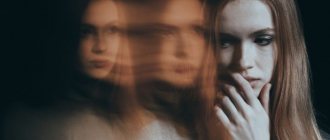Ivan Vdovin
1672 1 0
Few people can admit their childhood fears. There are even fewer who can look their fear in the eye. And this is the most key method with the answer to the question of how to stop being afraid of the dark. But it’s business, and you need to be fully prepared if you, of course, want to remove your childhood fears and become even more self-confident.
What Lies Behind the Fear of the Dark
Behind the fear of the dark lies something that we do not know and do not expect. Can be compared with our life. We don't know what will happen tomorrow, and everything can change at any second. Imagine you are alone in the dark and suddenly an image of what you are afraid of appears in front of you. What are your plans? Are you planning to die right away or are you still resisting?
But if you know and understand your fear very well and believe with complete confidence that all evil spirits are the inventions of science fiction writers, you will not be afraid. And with complete confidence you will walk through the dark forest completely alone.
I’ll say it again, it’s not the object itself that we’re afraid of, but the fact that it may appear suddenly and greatly frighten us. And it seems to me that any person will be afraid if he does not have experience interacting with various ghosts, spirits, aliens and so on, what we are afraid of.
Fear of the dark: Nyctophobia, who can experience fear of the dark?
Many in childhood, and not only in childhood, fall asleep covered with a blanket to the ends of their hair. At the same time, they are afraid to even move or stick out even one finger from under the blanket. They think that as soon as they do this, they will be bitten by a monster just waiting for you to move.
Or, for example, they are afraid to get out of bed and walk down the dark corridor to the toilet. Such people would rather endure until the morning, but under no circumstances will they get up. Or they listen to every rustle; the slightest extraneous sound depicts in their imagination thieves silently sneaking into their home.
If you recognize yourself in these descriptions, you have a fear of the dark.
Important: This fear even has a name - nyctophobia . In fact, fear of the dark is a very common phobia.
Fear of the dark
According to statistics, 8 out of 10 children experience a fear of the dark. Over time, many children's fear goes away, but some still cannot part with their phobias.
Adults are ashamed to admit that as soon as the lights turn off, their hearts begin to pound strongly, they feel a rush of heat, and their limbs seem to go numb.
While a small child can tell his parents without shame that he is scared, an adult will never admit it. After all, many will simply start laughing at this “childish”, “stupid” fear.
Needless to say how much this fear ruins life. Every night, a nyctophobe, going to bed, thinks about one thing: “I wish I could survive until the morning.” Such people will never go to bed without checking that the sockets are working properly, that the doors are double-locked, and they will not open the windows, even if it is 40°C outside.
Nyctophobes suffer from insomnia; fear prevents them from falling asleep. Sleep occurs only when the body simply switches off. In the morning these people are like a squeezed lemon.
Psychologists believe that children with a strong fear of the dark perform worse at school than their peers, suffer from insomnia and rarely become leaders.
You need to fight the fear of the dark, and in order to successfully cope with your phobia, you need to learn about its causes.
Do you need to get rid of your fear of the dark?
Let me ask you a question: Are you so afraid of the dark that you even sleep with the light on? If the answer is yes, then you urgently need to work through your fear of the dark. If you just feel uncomfortable in the dark and different thoughts come into your head. Can you bear it? In the second case, I think you don’t have to worry too much.
But with the first example we need to do something. And do it gradually, and not immediately rush into battle. Once I was visiting a friend in the village, and his grandmother was very afraid of the dark. So, when there was no one at home, she slept only with the light on. As a child, she saw something and since then she has not been able to overcome her fear of the dark. And I understand her perfectly.
How to overcome the fear of the dark in adults, teenagers and children: advice from a psychologist
Usually, phobias develop steadily by the age of 18, and then disappear between 45-50 years. Therefore, such a disorder can be found extremely rarely in older people.
There are quite a lot of effective techniques and tips on how to get rid of the fear of the dark. Let's take a closer look at them.
Tips for adults
- Analyze your anxiety. Think about what reasons caused your fear of the dark. If there is no rationality behind it, then over time you will convince yourself that there is no point in being afraid.
- Try to calm down before dark. Take a break with a relaxing bath, aromatherapy, and herbal teas. Watch a good movie, read a book, or write down important events and conclusions of the day.
- Change the decor in the room. Sometimes the fear of the dark is caused by frightening shadows from familiar objects. Perhaps you just need to move the lamp to another corner of the room so that the hanger, figurine or any other item looks harmless. An excellent solution would be to add as many light objects as possible to the interior.
- Follow a daily routine. Sleepless nights will not help you reduce anxiety, and disrupted hormone production will only make the situation worse. A properly organized sleep schedule will help calm your mental state.
- Watch your diet. Don't overeat and avoid large meals 4 hours before bedtime. Substances that help digest food make it difficult to fall asleep peacefully, and heaviness in the stomach will be an unpleasant consequence. At the same time, hunger should also be avoided: a light snack or a glass of kefir is quite appropriate.
- Don't stay in complete darkness and silence. You can dilute the frightening situation with the muted light of a night lamp or relaxing sound effects: a fan, sounds of nature, music for relaxation.
- Make sure your home is safe. Think about what might be bothering you and eliminate the source of fear. This could be window locks, blackout curtains, or a security system. Next to the bed, place a phone, a flashlight, pepper spray - whatever you consider necessary, because the main thing is calm.
- Create comfortable sleeping conditions. Choose comfortable pillows and bedding that will be pleasant to the body. The most important thing is to maintain the room temperature at 18-22 degrees. It will help you sleep soundly, calmly and without nightmares.
- Before going to bed, try to think about positive things. Such thoughts will set you up for a good night's sleep. But negativity, on the contrary, can cause bad dreams, due to which you wake up in a broken state.
- Find people who suffer from the same problem. Such friends will not only be interested in listening to your concerns and fears, but will also support you when your anxiety reaches its limit.
Tips for children and teenagers
- Discuss with your child his fears during daylight hours. Find out what exactly he is afraid of, and give him confidence that you will definitely protect him from any dangers and monsters.
- Check out all the things that scare your child together. Show him by example that there is nothing to be afraid of: check the cabinets, curtains, the space under the bed and demonstrate that there is nothing in any corner. Give your child a flashlight and let him look around in all the dark places.
- Do not acknowledge the existence of monsters, little drums and other mystical creatures. They will only reinforce and intensify the fear of the child, who still unconditionally believes the words of his parents. If your child complains that there is someone under the bed, you need to prove to him that it is just his imagination.
- Filter the information your child receives. The fragile psyche of children is not yet ready to accept horror films, action films, nightmare stories and violent video games without consequences. All this only contributes to the development of fears and emotional stress.
- Play quiet games and read books before bed. This will help the child fall asleep faster and more deeply. Choose classic works whose content you know: folk tales, stories by N. Nosov, M. Zoshchenko, poems and fairy tales by B. Zakhoder, A. Barto, S. Marshak and other authors
- Place a night light in the children's room. It will be more comfortable for the child to fall asleep not in complete darkness, and if the device is in the shape of a cute animal or fairy-tale creature, then the baby will also have a reliable sleep protector. Choose a night light carefully: it should not be too bright, and the spectrum of light should be warm, not cold.
- Don't leave your child alone until he falls asleep. Parents are the most reliable protection against any fears and phobias. Stay close to your baby while he falls asleep, but don't do it too often to avoid developing a habit. You can also agree on a compromise: leave the door to the children's room ajar so that a strip of light is a symbol that you are nearby.
What can you do to stop being afraid of the dark?
I'm looking for 5 people who want to feel comfortable and confident in the dark.
Do you sleep with the lights on...
Are you afraid to spend the night alone in your apartment...
You are sleeping under the covers and it seems to you that someone is looking at you...









